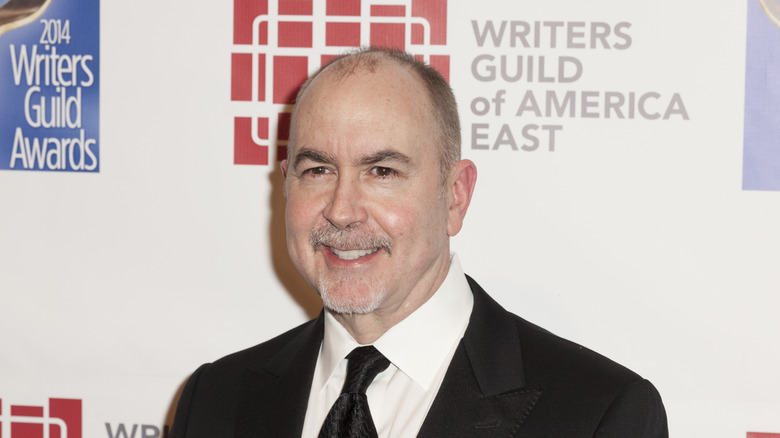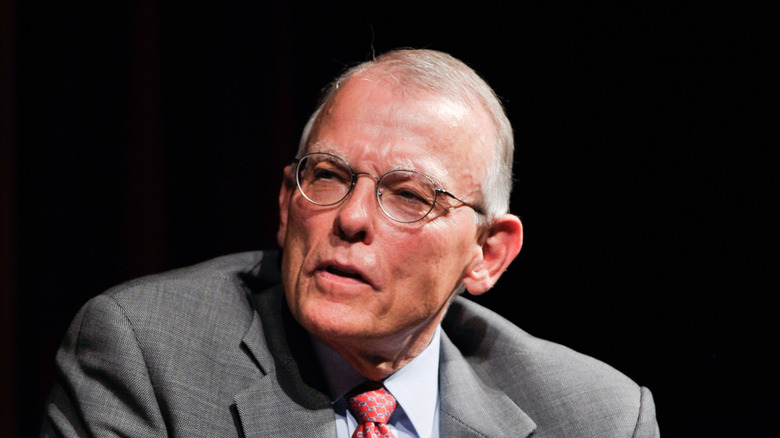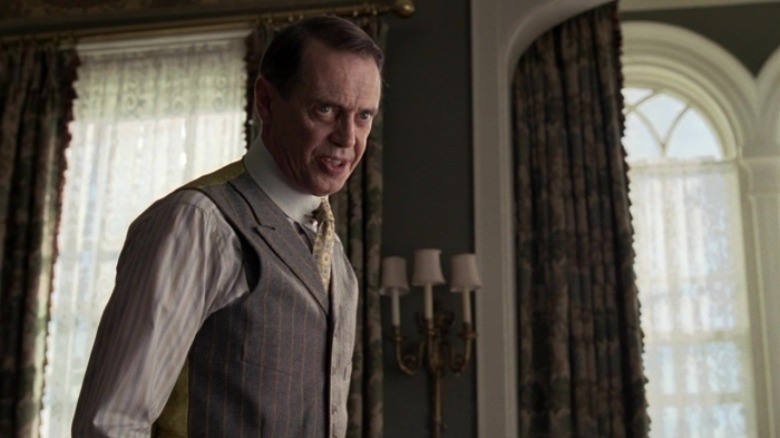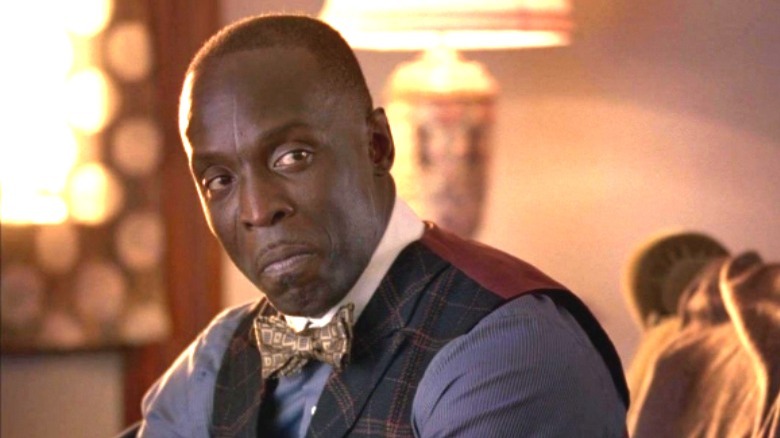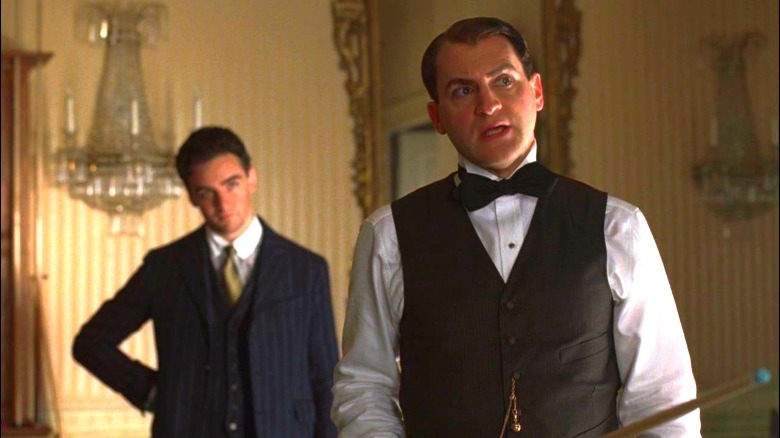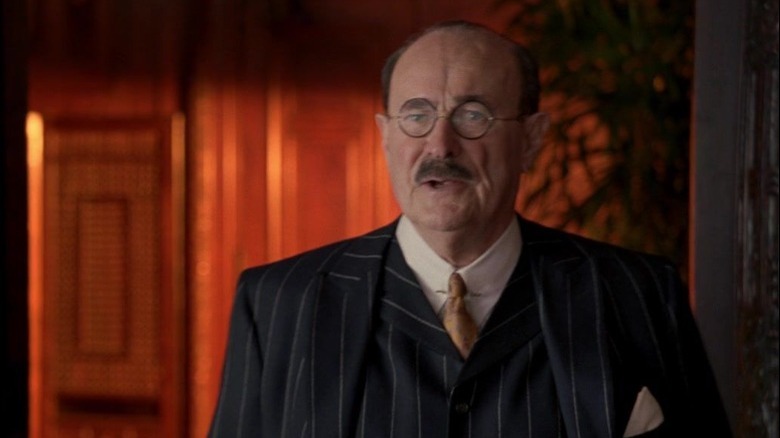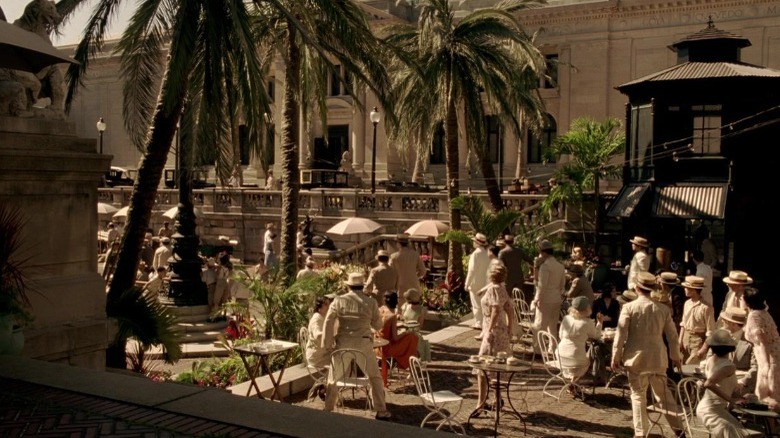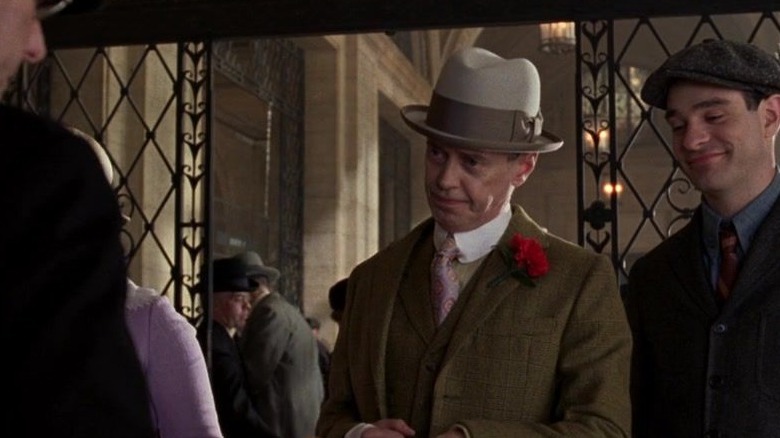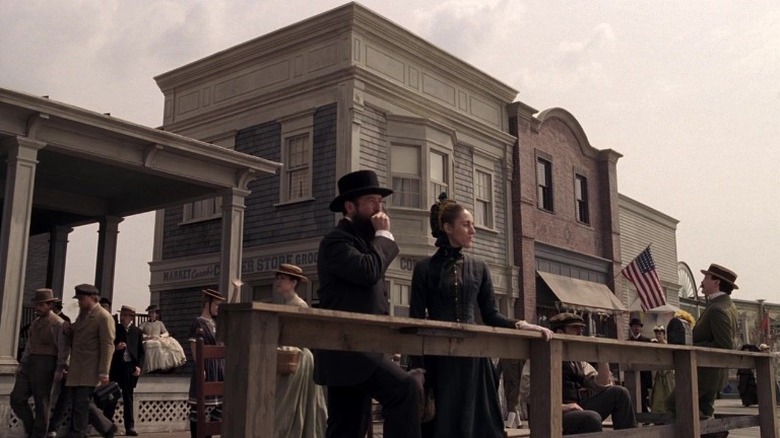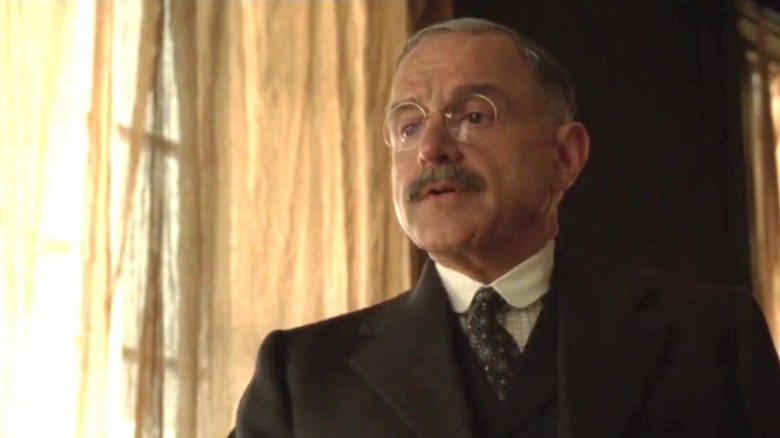Boardwalk Empire: Facts About HBO's Hit Series That Are Worth Drinking To
The HBO period drama "Boardwalk Empire" dramatizes the real-life organized crime underworld of Prohibition-era Atlantic City, New Jersey. A corrupt politician named Enoch "Nucky" Thompson (Steve Buscemi) is at the heart of this series, which follows Thompson as he rises to power in the 1920s. Nucky symbolizes the underground created by the 18th Amendment, which was aimed at reducing crime in America. As the series unfolds, audiences also meet fictionalized versions of familiar famous gangsters such as Al Capone (Stephen Graham) and Mickey Doyle (Paul Sparks). However, despite an abundance of criminal enterprises and shady business deals, all the characters in Nucky's world are multi-dimensional and sympathetic in their own ways.
The series aired for five seasons and garnered numerous awards and nominations during its successful run. Of course, the on-screen drama is just one piece of the "Boardwalk Empire" puzzle. Like any television show, it took a massive creative team and untold hours of labor to bring this series to life. In the end, unexpected changes, brilliant casting, and sometimes sheer luck combined to create this world full of unforgettable characters. The story behind the creation of the series is full of intriguing facts and surprising moments nearly as riveting as the show itself.
Terence Winter is no stranger to crime dramas
Series creator Terence Winter did a masterful job of bringing the criminal underworld of Prohibition-era Atlantic City to life. That might be because, before this series, he had plenty of experience with mafia-themed material. In an extended interview, Terence Winter discussed his time as a writer for the hit series "The Sopranos." In particular, he described his familiarity with the type of characters he saw in the series pilot and his efforts to earn a chance to join the creative team. Winter credits "The Sopranos" writer-producer David Chase as an invaluable mentor to him during his time as a writer for Season 2.
Although "Boardwalk Empire" officially ended in 2014, Winter is still hard at work in the mobster genre. According to Deadline, Winter served as a showrunner for the Paramount+ series "Tulsa King." The series pairs winter with "Yellowstone" creator Taylor Sheridan and stars Sylvester Stallone as a mafioso who finds himself in Tulsa, Oklahoma, after a lifetime of fast-paced organized crime in New York. Additionally, in 2022, the production company Asterlight announced that Winter is working on a limited series detailing the exploits of police officers with mafia ties. Like "Boardwalk Empire," this series also takes inspiration from a book about actual events.
Boardwalk Empire was a book first
Many of the best television shows take inspiration from books, and "Boardwalk Empire" is no exception. According to Mark Di Ionno of NJ.com, author Nelson Johnson built his career as a judge for Atlantic County before writing a book about Atlantic City's history. Di Ionno reports that Johnson was excited to see his book, "Boardwalk Empire," dramatized and brought to life by Terence Winter. Unlike the Prohibition-era drama, the fact-based book covers several historical periods. After finishing the book, Johnson felt that a character as compelling as Nucky belonged in a film and thus began searching for an interested producer. In the end, the book found its way to Winter.
In an interview with NPR, Winter describes his initial involvement with the "Boardwalk Empire" project as sheer happenstance. According to Winter, producers at HBO gave him the book and asked him to conceptualize a television series based on it. Winter notes that he found one period of Atlantic City history especially appealing: "...the 1920s just offered this incredible, sweeping time in American history, with a lead character at its center, that was just absolutely compelling and a guy that I couldn't wait to set a TV series around." Winter, therefore, centered on this period as the basis for his acclaimed crime drama.
Steve Buscemi nearly quit acting
The thought of "Boardwalk Empire" without Steve Buscemi as Nucky Thompson may be hard to fathom, but it nearly happened. In an interview with Gabriella Paiella for GQ, the actor explains that he struggled to see the point in continuing his acting career. According to Buscemi: "I felt like I was at an odd age where I was too old to play some characters, not old enough to play other characters." He began seriously considering permanently moving into the world of directing.
However, in an incredible bit of luck, Buscemi received a call from producer Terence Winter before he could quit acting for good. Although Winter was calling to cast Buscemi as Nucky Thompson, the actor had become so accustomed to rejection that he dejectedly thanked Winters for the opportunity before realizing he had received an offer to participate in the show. Naturally, Buscemi agreed to participate in the project, and Nucky Thompson arguably became one of his most iconic television roles. According to Paiella, "Boardwalk Empire" was a turning point in that stage of Buscemi's career, and he has remained active in the acting world ever since.
Nucky Thompson really existed
Enoch "Nucky" Thompson is an incredibly well-developed character based on an actual Atlantic City politician. According to The Mob Museum, Nucky's real-life counterpart, Enoch Johnson, served as the sheriff of Atlantic County in the early 1900s. He evaded an election fraud conviction in 1911 and gained substantial wealth during the Prohibition era. Like his fictional counterpart, Johnson successfully toed the line between politician and mobster for decades. However, unlike the fictional Nucky, Enoch Johnson never resorted to having his enemies killed. According to author Nelson Johnson (via NJ.com): "He didn't have to. He had so much power that if you didn't play ball, he would just freeze you out."
Nucky Thompson is not only more cutthroat than the man who inspired his creation, but also looks quite different. The real Enoch Johnson was known for his imposing stature, but Steve Buscemi has a very different build. Most importantly, the two men don't share a last name. In an interview with NPR, Terence Winter explains that a desire to take creative license with this larger-than-life character was the impetus behind changing his name. According to Winter, this symbolic difference gave him more room to stray from reality and fully realize his vision of the Atlantic City gangster. Whereas the real Enoch Johnson enjoyed a long, quiet life after moving on from his criminal enterprises, Nucky Thompson suffers an untimely death that brings his story to a more dramatic conclusion.
Michael Kenneth Williams was cast remotely
Albert "Chalky" White is an undeniably powerful Black community leader on "Boardwalk Empire." Like Nucky Thompson, White is duplicitous and cunning, staying one step ahead of his enemies in most instances. He is a smooth-talking racketeer who uses his charm and influence for financial gain. However, White genuinely cares about his community's well-being. "The Wire" star Michael Kenneth Williams gives a performance that makes this antihero genuinely unforgettable, but he didn't land the role conventionally.
Before his death, Williams explained how he came to play Chalky White in a Q&A with Cinema Daily US. According to Williams, Martin Scorsese's assistant called about the role while he was working on another project in Cape Town, South Africa. Williams sent in a taped audition with little hope that Scorsese would cast him remotely, but the recording was enough to land him the part after all.
When asked how he brought Chalky White to life, Williams said that he took inspiration from older men in his family to build a connection between himself and the character. For example, as Williams described: "He wore his clothes like my father did. When he was with his kids, he reminded me of Uncle Jay, when I would sit on my uncle's lap and he was always scratching his beard."
HBO used a unique marketing tactic
HBO spares no expense to promote their original series, including "Boardwalk Empire." The network employed a unique marketing tactic to promote the Season 2 premiere. According to The Wall Street Journal, HBO shelled out $150,000 for a partnership with New York's Metropolitan Transportation Authority. As part of the partnership, the MTA agreed to run a genuine Prohibition-Era subway car for a few weeks before the Season 2 premiere aired. The train made limited stops on the 2/3 line but was fully operational. Business Insider notes that the promotion also featured actors in period-appropriate costumes, who distributed free Metro cards to potential riders.
Many riders shared their "Boardwalk Empire" subway experience on social media. One YouTube video captures the train car parked at a station. The train's restored exterior looks similar to subway trains of today but maintains its vintage character. The car even has an ad for the upcoming premiere in one of the windows. The video also shows the inside of the train, which features multiple promotional posters for the series and a retro-style ad featuring Nucky Thompson's name. It was a creative twist on the usual subway advertising campaign that likely left a lasting impression on viewers.
Creators were open to suggestions
When it comes to period pieces like "Boardwalk Empire," many actors devote long hours to studying the worlds their fictional characters would have inhabited. For example, The Providence Journal explains that actor Michael Stuhlbarg put significant effort into researching his character, Arnold Rothstein. The powerful gangster is probably best known for illegally affecting the outcome of the 1919 World Series and profiting from its result. Stuhlbarg worked hard to capture Rothstein's personality, and the talented gambler is undoubtedly one of the strongest secondary characters in the first four seasons. He initially comes to Atlantic City to establish a connection with Nucky, but relations between the two men quickly go south as Season 1 unfolds.
According to Stuhlbarg, the creative team behind the crime drama made it easy for actors like himself to provide input on their characters. Stuhlbarg explains: "One of the blessings of being on the series is that everyone in the writers' room is amiable to those playing historic characters. They allow us to chime in with research we have found." This welcoming attitude undoubtedly contributed to the historical accuracy of "Boardwalk Empire," which is one of the show's greatest strengths. Although the series mixes actual events with a heavy dose of drama, most of the characters are at least loosely similar to their real-life counterparts.
The Commodore's illness was real
Occasionally, off-screen events have severe consequences for the direction of a television character's storyline. In these instances, writers must scramble to adjust scripts or make sweeping changes to a show's short-term plot. For example, while preparing to work on Season 2 of "Boardwalk Empire," actor Dabney Coleman discovered he needed treatment for throat cancer. Coleman's character, Louis "The Commodore" Kaestner, was a pivotal part of Season 1 and was set to play an equally significant role in the second season. According to AV Club, news of Coleman's diagnosis left Terence Winter with some tough choices to make about The Commodore's storyline.
In his response to the AV Club, Winter explains that the writing team went to great lengths to get all of Coleman's Season 2 scenes written as quickly as possible. They also changed the storyline to include a temporary illness, which created the perfect opportunity for Coleman to take a break from filming and focus on his treatment. Winter also says that the actor filmed his scenes in an incredibly concentrated period instead of on a regular filming schedule. Although The Commodore's on-screen illness was a significant change from the original plan for his storyline, Winter believes that this update was a blessing in disguise. In the end, it added more tension to this crucial storyline and strengthened the whole season.
Havana is really Prospect Park
The fifth season of "Boardwalk Empire" takes Nucky Thompson away from his familiar New Jersey boardwalk and drops him in the heart of Havana, Cuba. According to production designer Bill Groom (via The Credits), several locations were in the running to serve as 1920s Havana, including Puerto Rico and the Dominican Republic. However, as Groom notes, the design team finally decided that they could build their sets in New York instead. He and his team were able to locate New York architecture that resembled styles used in Cuba in the 1920s, which is part of what makes the scenes look so convincing.
Groom also explains that the crew imported palm tree sculptures and live fronds from warmer parts of the U.S. for an extra dose of authenticity. One of the most memorable locations from Nucky's time in Cuba is a stunning bar called Rubia Sucia, which looks like it would be right at home in a tropical paradise. However, the actual location of this setting was anything but paradise: the design team constructed the bar in an old tennis pavilion in Brooklyn's Prospect Park. Groom says he achieved the bar's elaborate aesthetic using a combination of salvaged and fresh-built elements.
Fans petitioned HBO
Hurricane Sandy devastated the Northeastern United States in 2012, leaving thousands of people without power and destroying homes and businesses. In the aftermath of the storm, one "Boardwalk Empire" fan called upon HBO to provide aid to residents of Atlantic City, the hit series' primary setting. According to Christopher Zara of IBTimes, a media-reform organizer named Hannah Sassaman circulated a petition asking the series' creative team to contribute to Hurricane Sandy relief efforts. Sassaman believed the network's far-reaching influence could bolster fundraising initiatives and help restore storm-ravaged areas in Atlantic City. Zara also notes that Sassaman's goal was to collect at least 100 signatures and send the petition to HBO's vice presidents.
Ultimately, HBO and many other networks substantially contributed to Hurricane Sandy relief funds. According to The Hollywood Reporter, Time Warner (HBO's divisional partner at the time) pledged $1 million in aid to disaster victims. The media company also participated in a multi-network benefit concert, which raised even more money for disaster relief. Furthermore, as Sassaman herself notes in the petition's updates on Change.org, some of the "Boardwalk Empire" crew made their own efforts to assist the local community. According to Sassaman: "Steve Buscemi — Nucky Thompson himself!– is fundraising for Hurricane Sandy-impacted first responders. Thanks to him and HBO for stepping up for these communities!"
Terence Winter gave notice
Sometimes actors take the news of their characters' demise just as hard as fans. Actors often don't find out about their character's death until it comes up in the show's script, but "Boardwalk Empire" producer Terence Winter preferred to break the news ahead of time. According to an article from CinemaBlend, Winter made a habit of calling actors about their characters' upcoming deaths before they could be surprised by it in the script. However, the article notes that these courtesy calls had an unintended consequence: actors began to assume that any call from Winter automatically meant their character would die.
However, there was one exception to Winter's rule about making these difficult calls. In an interview with The Hollywood Reporter, Winter reflects on the time he had to tell Michael Pitt that his character, Jimmy Darmody, was going to be the series' next casualty. As The Commodore's son and Nucky Thompson's protégé, Darmody is a significant character in the show's first two seasons. In the interview, Winter notes that deciding to ax this pivotal character was among the most challenging decisions he made for the series. Unfortunately, Pitt was vacationing in an area with limited cell phone service, so Winter and fellow producer Martin Scorsese had to email him the news. Although Winter reports feeling terrible about revealing Darmody's impending death in this manner, he does note that Pitt took the notice in stride.
The series built lifelike sets
Whereas realistic shows set in the modern era can simply pick a location and start filming, historical dramas must transform their environment to match earlier historical points. The 1920s world of "Boardwalk Empire" is undeniably lifelike, right down to the minor details. Special effects certainly play a role in bringing audiences back in time to the Prohibition Era, but the show also owes its realism to meticulously built sets. For example, during Season 5, audiences learn more about Nucky Thompson's history through flashbacks to his childhood in the 1880s. These flashbacks are visually striking, but bringing Nucky's childhood world to life was no small feat.
Lisa Colangelo of the New York Daily News explains that the series' crew transformed an unused section of the Far Rockaway boardwalk into a stunning nineteenth-century Atlantic City for these flashbacks. Colangelo notes that this realistic set included an arcade, a hotel, and several shops that mimic the types of businesses real-life Nucky could have encountered during this period. Photos of the set also depict vendor booths along the boardwalk, which add more local color to the scene. Amazingly, the set was in place for just a few short weeks of filming. Colangelo reports that, according to New York Assemblyman named Phil Goldfeder, local residents enjoyed having a television crew in their community.
Anthony Laciura received family heirlooms
One of the unsung heroes of "Boardwalk Empire" is Eddie Kessler, a smart, resourceful former bartender who serves as Nucky Thompson's right-hand man. Kessler is privy to many of Nucky's most private thoughts and feelings and regularly takes verbal abuse from his employer with grace. Kessler also provides much-needed comic relief throughout the series, which makes him an undeniably lovable character. According to Nola.com, the real-life Eddie Kessler found himself at the center of Atlantic City society due to his position as Nucky's assistant.
Actor Anthony Laciura does a masterful job of portraying this essential secondary character, right down to adopting a very believable accent for his audition. His performance also caught the attention of the Kessler family. Atlantic City Weekly explains that Eddie Kessler's granddaughter, Jamie Satz, made contact with the actor once production began. Lacuria notes that he jumped at the chance to meet her because it presented a rare opportunity to get to know his character more deeply. Satz gave Laciura valuable information about her grandfather, introduced him to other family members, and developed a close relationship with him over time. Most notably, Atlantic City Weekly reveals that the Kessler family gave Laciura a priceless gift: the real Eddie Kessler's pocket watch. Starting in Season 2, fans see the harried assistant regularly check that exact watch on screen.

